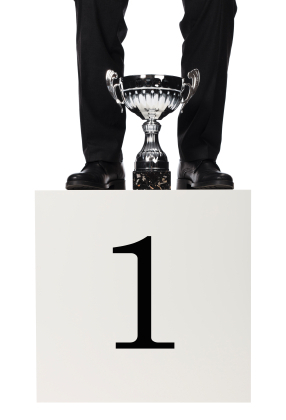T. Harv Eker's Blog, page 21
October 28, 2011
Your Business Reflects You
If someone told you, right before you got out of the gate, "Sixty-three percent of all businesses fail within the first six years," would you still want to start a business?
That's the figure according to the U.S Bureau of Labor Statistics. That means most people stand a little bit better than a 50/50 chance of, at minimum, staying above water; we're not even talking about profitability.
Given that reality, it's good to remind ourselves of why we wanted to do this business thing in the first place. Some people want to make more money. Perhaps it's about taking care of your family, or taking care of them in the style you'd like. Maybe you want to be a better provider, a better parent, or a better spouse. It could be about more freedom, or more quality time.
Some people start a business because they believe it will give them greater security. They realize that working for somebody else and having someone else make fundamental economic decisions in their lives just doesn't give them the kind of control they want. So they start a business for a different lifestyle.
Whatever the reason, the same fundamental question remains: what's so important about any of this? What's really behind it all?
I think—just as important as taking care of loved ones, or being successful, or being in control, or even being free—we are most basically fulfilling the creative impulse to grow something, to make something that didn't exist before, and to nurture it as best we can. It really helps to understand this when it seems like the steam may be going out while trying to get your business up and running. This isn't and can't just be about money—though that is a pretty obvious goal for whatever those reasons we see above.
You also can't ignore the "maverick," individualistic impulse to do something different, or something completely unusual, so you build a business, go out there and you learn something. You develop a core expertise, gain some experience, and build your business around that.
There are so many basic human elements to creating a business—freedom, or accomplishment, care for others, individual expression—it makes you wonder how we could stand to live by not starting a business?
Our reasons better be more than just "success," though, because if you make it past that 63% mark, the bigger that you get, the more the headaches come, and then it just kind of gets worse if you don't know what you're really getting into—if you're not properly educated to give yourself a chance to make it well beyond that 63% mark.
This is the essence of what takes that 27% percent of successful business owners beyond those first six years. It's knowing that success is not just measured in numbers alone—but again, when those numbers increase, it sure as hell does feel good, yes or yes?
It's also understanding that success as a business owner entails reaching down into yourself, your creative spirit, and bringing that out into the world meaningfully. It's as spiritual as it is material, and we'd all do better for ourselves and our impact on the world to honor that.
What's your opinion? We want to hear from you!!!
October 21, 2011
Success Takes More than Skill
Two hamburger joints open back in '67 … we'll call one Bob's Burger Shack. Great hamburgers! The other shop is McDonalds. The rest is history, yes?
Were Mickey D's burgers really that much better than Bob's? I mean, really … how hard is it to get a burger right? Even Ray Croc himself admitted this to eager business school students he lectured in his lifetime. He'd ask them, 'How many people in here can make a better hamburger than McDonalds?' Everyone would raise their hand because everybody's made a tasty burger before, at least tasty by their own standards. But then he'd ask, 'How many people make more money than McDonalds?' Naturally, all hands dropped.
It's a simple yet eloquent demonstration that it doesn't matter whether you have a better idea, a better product, or a better service. In business, the only thing that matters is getting that product, idea, or service out to as many people as possible, and/or at as much profit as possible.
It's the learning curve of the entrepreneur—amassing the skills necessary to take what you have to offer to a mass audience profitably, which anybody can learn how to do, but it also takes a nerve and determination that most people just don't show when it comes to taking control of their financial future. That kind of moxie can be the rope that saves you instead of binds you in stagnation after a big failure.
Few people have the kind of moxie that Karl Eller has. He's a legend in Arizona but a giant in business period. He started out in billboard advertising; was one of the founders of the NBA Phoenix Suns basketball team; president of Columbia Pictures at one point, which he helped merge into Coca-Cola—amazingly successful businessman.
But he had a major setback, to say the least. He built another company called Circle K—a kind of convenience store—into the second largest chain in the U.S. during the 80s. Under his leadership, the company grew from something like $750 million in sales to $3.4 billion!
Then the company filed bankruptcy in the 90s, due in part to just a bad turn in business. He was forced to leave with $100 million in personal debt! Can you imagine being $100 million in debt? Not your company … you, personally???
Instead of declaring bankruptcy, though, Eller dug himself out by going back into what he knew well: outdoor advertising. Eller built another media company and merged with Clear Channel Communications for a then-record $1.15 billion!
And he did this when most people are retiring.
His track record is elegant proof that the question isn't what type of business you want to go into—or at least that's not the essential question. You're going to find your niche, and you're going to be better at that particular field of interest than others—whether we're talking about burgers or billboards.
The essence of success in business, I believe, is the intangible quality that means having integrity no matter what the situation—win or loss—not being afraid to take risks, and your ability to bounce back after tremendous setbacks.
What do you think? What do you consider to be some of the intangible qualities of business success? The millionaire Mind community wants to hear from you!!!
October 14, 2011
Narrow It Down
When it comes to generating the momentum of market presence, you want to cast the widest net possible that makes sense to your niche, and then be more discerning about who you're spending time on later in the process.
The top producers, though, have learned to cast a smaller net that catches bigger fish. Chet Holmes, one of the top sales producers in the country today—the guy turns bad sales around in struggling companies unbelievably—said, "There're always a smaller number of best buyers rather than all buyers."
What the hell does that mean? It just means narrow down who you're targeting to prospects that—although smaller in number—would bring in much more revenue than all the small fish combined. Linking with these big fish would not only save you time and energy, but could be great ways to affiliate, partner with, and otherwise make marketing and sales easier than fishing on your own.
You're a real estate broker in your town. Who are you going to in order to start generating leads? Who are you targeting before you start sending out direct mail to every household in the town? Who, if you were famous among them, would drive so many referrals to you that you couldn't even handle it all?
You're looking for the most influential people who have access to the same types of prospects you want, and you're pounding them relentlessly. That would be the people who live in the most expensive homes in your town. You make this a must in your marketing budget.
Pick the dream prospects! It's the most cost effective method of building your business without spending a lot of money.
These select people looking at your face in the mail once a month, every month may not need you now, but when they do, they know like clockwork that your flyer's coming in the mail. Commission on one expensive house sold could more than make up for the marketing budget on that strategy. When it comes to high-end real estate in that area, you'd be at the top of those people's minds, even when most of the time they weren't thinking about you.
Even when we're talking about in-store client relations, we still want to be narrowing down what we want out of each interaction, so it's still a mindset of quality of interaction versus number of interactions. How could you get one customer to buy more than just the item they came it looking for? Or a number of more expensive items?
How can you make the first point of contact more interesting right from the first or second sentence or with the first thing you show them? How can you make it more attractive, more appealing, and more exciting?
Get clear on your objectives. Most people are not strategic. They don't think like, 'How many things do I want to accomplish with the buyer?' It changes the whole quality of the interaction when you start thinking strategically.
The more narrow and focused your objectives, the more impact you will have right from the very beginning, and the quicker and faster you'll grow with less effort. The biggest element is persistence, patience and commitment to really seeing this strategy through.
Give us your opinions, comments or stories. The Millionaire Mind community wants to hear from you!!!
October 7, 2011
Experts Say … Be An Expert
Watch the news and observe the so-called "experts" on the economy or the latest tabloid trial. When you're the expert, people pay attention to you more and take you up on your words. But what makes them more authoritative on a topic than anyone else?
Experience helps and knowledge helps, but the real difference is a keen eye for details. And if you happen to be passionate about the topic, it's a lock.
It's no different in business. What does an expert get in a sales situation? You get credibility before you even get started selling anything. People come to you and you can charge more money. And your ability to position yourself as an expert is far less complicated than you might think.
You start off with information that's of interest. 'Did you know that today, you're spending three times more money in advertising to try and get the same result that you would have gotten ten years ago?'
I might be selling marketing programs to make you more effective, but I gave you factual information. That's real data, and it's power like you can't believe. What business owner wouldn't want to stick around and hear free information about that (You are giving that info away for free!)? And you're positioning yourself as an expert on how you can help them fix common marketing problems.
Before you sell anything, you set up criteria on what would be important to your audience, something that they couldn't logically say no to. It should be full of interesting and good data that is of value to your prospects, things that would make them say, 'Holy Crap!' or, 'I didn't know that.' 'Hmm that's interesting!'
Of course, you can't just say you're an expert; you actually have to know what you're talking about, so it requires research. You can outsource it or have an assistant gather it, but you still have to take the time to read it, understand it, and know it. If you can articulate it thoroughly, understandably, and passionately, guess what? As far as anybody knows, you're an expert in that! Time and experience strengthens that.
If done properly and with integrity, it can be powerful, but in general so called "experts" are also overrated. In his book "Expert Political Judgment—How Good is It?" Philip Tetlock collected over 80,000 forecasts over a 20-year study of almost 300 political experts whom he asked a range of questions: would there be a non-violent end to apartheid in South Africa? Would the U.S. go to war in the Persian Gulf? The experts were bad at predicting, nor did specializing in a field improve their answers. Journalists and average people did about as well as the experts when it came to predicting the future.
That doesn't negate the impact of positioning yourself as an expert. It just means you can be as much of an expert as anybody else. It's about presenting facts passionately and undeniably. In business, market data or market trends are just as, if not more important, than knowledge in a particular area.
Any success we've found in business or in a career was because for whatever level we are at, we present ourselves as a specialist of sorts. How have you been able to position yourself as an expert or higher-quality professional? What impact did that have on your trajectory? The Millionaire Mind community wants to hear from you!!!
T. Harv Eker's Blog
- T. Harv Eker's profile
- 623 followers







